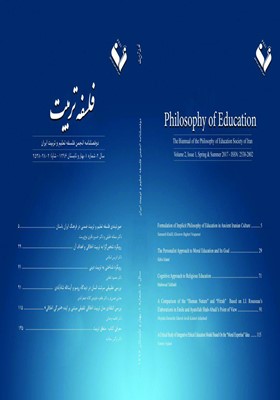واکاوی گفتمان تاریخی تولد مدرسه مدرن از منظر مناسبات قدرت پیرامون زندگی کودکان
محورهای موضوعی :
1 - دانشگاه تهران
کلید واژه: گفتمان تاریخی, تولد مدرسه, مناسبات قدرت, زندگی کودکان,
چکیده مقاله :
هدف اصلی این مقاله واکاوی گفتمان تاریخی تولد مدرسه مدرن از منظر مناسبات قدرت در زندگی کودکان است. از اینرو جهت تحلیل مناسبات قدرت در زندگی کودکان، با استفاده از مفروضههای تحلیل گفتمان انتقادی میشل فوکو به بررسی شرایط تولد و تحولات مدرسه در گفتمان مدرن پرداخته شد و همسویی این تحولات با قدرت مورد تحلیل قرار گرفت. برای تأمین هدف مطالعه ابتدا با استفاده از روش تحلیل اسناد، تاریخچه شکلگیری مدرسه از منظر فوکو و شارحان رویکرد او در نظامهای تربیتی توصیف شد. با توجه به توصیف انجامشده نحوه این دگردیسی از مراقبتهای تعذیبی مبتنی بر بدن تا شکل گیری شیوههای نهادی مراقبت از زندگی کودکان و توسعه مدارس بوده است. بر این مبنا، مهمترین تحولات گفتمانی عبارتاند از ظهور شیوههای مراقبت مدرن پیرامون کودکی، پنهانشدگی مراقبت تنبیهی پیرامون کودکان و درنهایت گسترش قدرت مدرن بر روح کودک در مدرسه مدرن. پس از توصیف تحولات گفتمانی، مناسبات قدرت پیرامون آن بر مبنای تحلیل اسناد پیرامون رویکرد گفتمانی به کودکی و تربیت مورد واکاوی قرار گرفت و نتایج نشان داد که تولد مدرن و شاخههای مختلف دانشی همچون روانشناسی کودکی و جامعهشناسی که به دانش تربیتی شکل داده است، حاصل تحول در ساختارهای زیرین اجتماعی، اقتصادی و سیاستهای جمعیتی و فناوریهای انضباطی بوده و لزوماً به رهایی کودکان منجر نشده و ازاینرو به تعبیر فوکو زندگی کودکان نیازمند رهاییبخشی نه از نهادها بلکه از نظام های سلطه است
The main purpose of this paper is to examine the historical discourse of the birth of the modern school in terms of power relations around the lives of children. The method used in this essay is Critical Discourse Analysis of Michel Foucault. In order to achieve the purpose of the study, the formation of new schools is analyzed from Foucault's point of view and his commentators. According to this description, a transformation has occurred from a body-based abstinence to institutional development of child care and school development. The most important discourse developments include the advent of modern childcare practices, the concealment of punitive care around children, and ultimately the expansion of modern power over the child's soul. Then, the power relations were analyzed based on a documentary analysis of the discursive approach to childhood and education. The results show that the birth of modern school and different branches of knowledge such as child psychology and sociology that shaped educational knowledge were the result of the evolution of the underlying social, economic, and demographic policies and disciplinary technologies and did not necessarily lead to the freedom of children. Therefore, the lives of children depend on the liberation not from institutions, but from the domination systems.
میلز، س. (1382). گفتمان، (فتاح محمودی، مترجم). زنجان: هزاره سوم.
اسمارت، ب. (1380). فوکو در بوته نقد، (پیام یزدانجو، مترجم). تهران: مرکز.
ساراپ، م. (1382). راهنمایی مقدماتی بر پساساختارگرایی و پسامدرنیسم، (محمدرضا تاجیک، مترجم). تهران: نشر نی.
فوکو، م. (1378). مجازات و تنبیه، (باقر پرهام، مترجم). تهران: نشر آگاه.
فوکو، م. (1370). قدرت انضباطی و تابعیت، (ف. رجایی، مترجم). تهران: مؤسسه مطالعات و تحقیقات فرهنگی.
Aries, P. (1960). Centuries of childhood: a social history of family life, (Robert Baldick, Trans.). New York: Pimlico.
Daymon, C. & Holloway, I. (2010). Qualitative Research Methods in Public Relations and Marketing Communications. London & U.S: Routledge.
Dekker, J. H. & Lechner D. M. (1999). Discipline and pedagogics in history: Foucault, aries, and the history of panoptical education, The European Legacy: Toward New Paradigms, 4(5), 37-49.
Elkind, D. (1981). The hurried child: Growing up too fast too soon. Sydney: Addison-Wesley.
Gordon, C. (1991). Governmental rationality: an introduction, In G. Burchell, C. Gordon & P. Miller (Eds.), The Foucault Effect: Studies in Governmentality (pp. 1–48). Chicago, IL: University of Chicago Press.
Habermas, J. (1994). The Critique of Reason as an Unmasking of the Human Sciences: Michel Foucault. In M. Kelly (Ed.), Critique and Power: Recasting the Foucault/Habermas Debate. Massachusetts: MIT Press.
Hindess, B. (1996). Liberalism, socialism and democracy: Variations on a governmental theme. In A. Barry, T. Osborne & N. Rose (Eds.), Foucault and political reason (pp. 65-80). London: UCL Press Ltd.
Millei, Z. (2007). A genealogical study of 'the child' as the subject of pre-compulsory education in Western Australia. Thesis presented for the degree of Doctor of Philosophy of Murdoch University.
Popkewitz, T. & Bloch, M. (2001). Administering freedom: A history of the present -rescuing the parent to rescue the child for society, In K. Hultqvist & G. Dahlberg (Eds.), Governing the child in the new millennium (pp. 85-118). New York & London: RoutledgeFalmer.
Prout, A. (2000). Children's participation: Control and self-realisation in British ¬late modernity. Children and Society, 14, 304-315.
Radford, Jr. (2005). Perfecting the paddle: Michel Foucault’s genealogy of disciplinary power, the Decline of Corporal Punishment in Schools, and the Move toward More ervasive Forms of Discipline. Available from: www.educationlawconsortium.org /forum /2005/ papers /radford.pdf.
Taylor, C. (1986). Foucault on Freedom and Truth. In D. C. Hoy (Ed.), Foucault: A Critical Reader. New York: Basil Blackwell.


